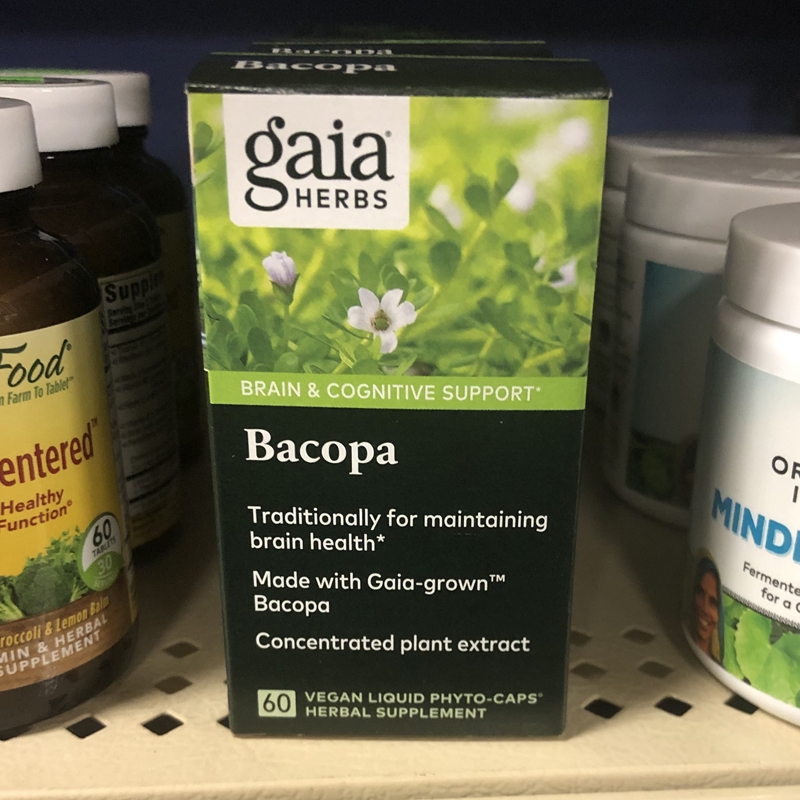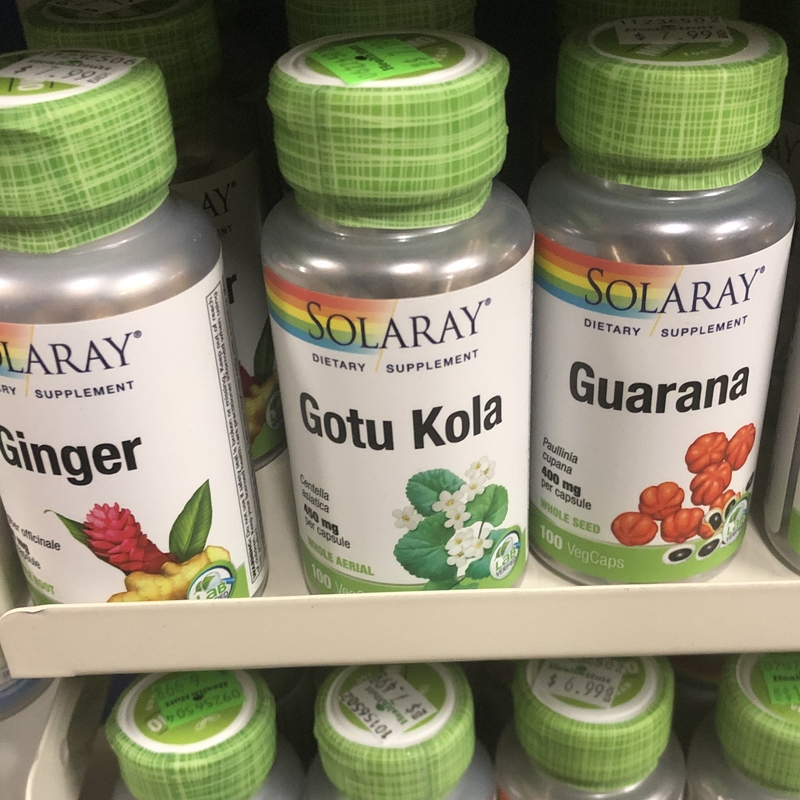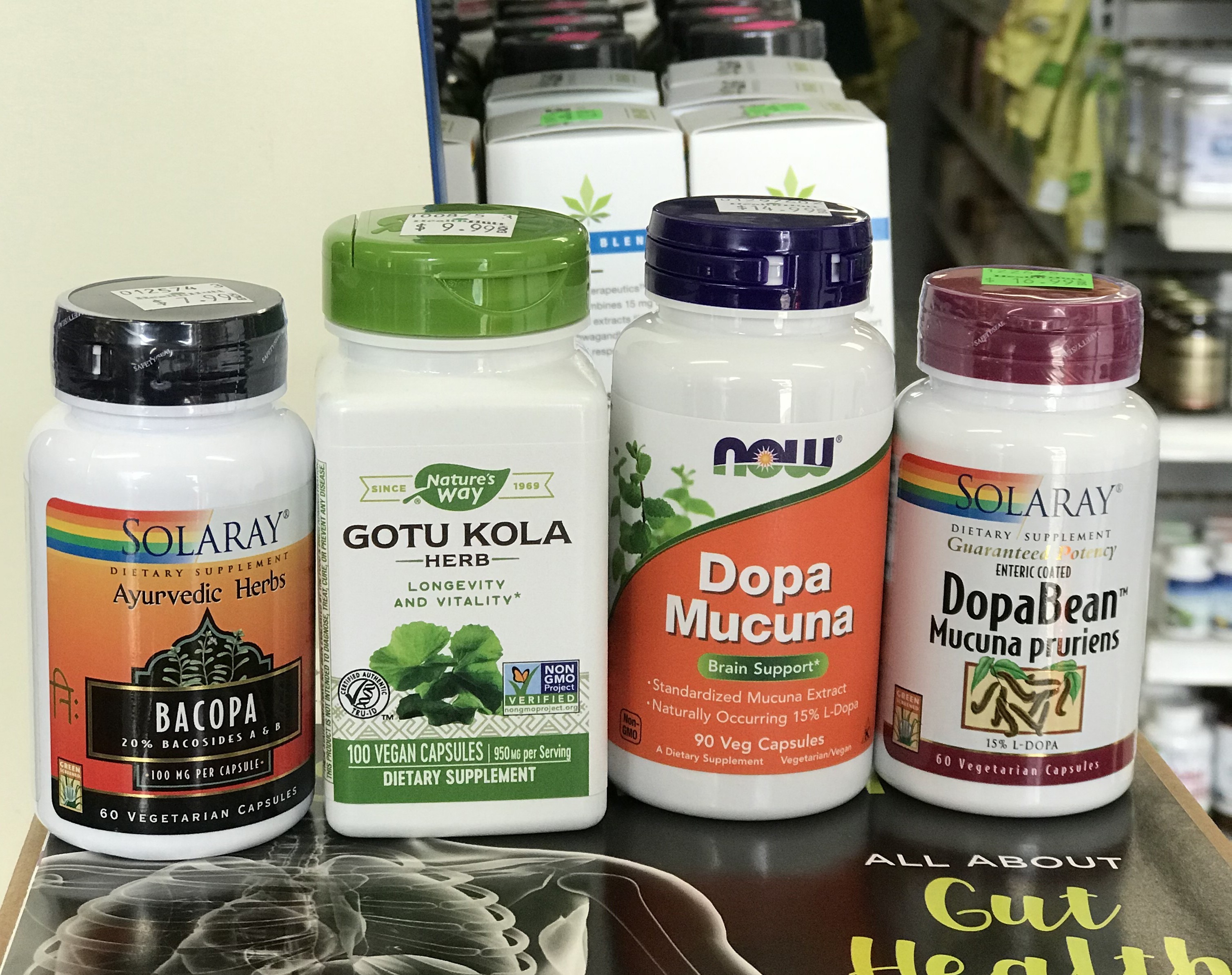Ayurveda is an Indian traditional system of medicine. In Ayurveda, Medhya Rasayana is a group of herbs that improve acquisition, retention, and recall. In other words, these herbs can enhance cognitive functions and improve memory. Both Gotu Kola and Bacopa are considered Medhya Rasayana and can be found quite easily in US stores. These herbs can also help to reduce stress and calm the mind. (9)
Mucuna helps the physical body’s ability to handle stress and can help to support the physical body – posture, motor skills, coordination and neurons. (4) Turmeric is an excellent and accessible anti-inflammatory – which is essential in cases of inflammation. Evidence is mounting that inflammation affects how one feels and can affect stress responses, cognitive thinking, memory, expression, mood, clarity, etcetera. (10)
Read more about these four herbs below.
Bacopa monnieri
In Ayurveda, bacopa is considered to be an herb that sharpens the mind and intellect. It is traditionally used in to treat conditions such as memory loss, anxiety, poor cognition and loss of concentration. (1) Bacopa translates to mean “expansive state of awareness”. It calms and soothes the nervous system and enhances learning, concentration and memory. (8)
Current research shows that the tea, infusion and alkaloid extracts of bacopa all can limit inflammation in the central nervous system by significantly inhibiting the release of pro-inflammatory cytokines from microglial cells and inhibiting enzymes associated with inflammation in the brain. (1) In studies with children, Bacopa produced a significant improvement in learning, memory tasks, immediate memory, and perception and reaction performance times with a 100mg dosage of bacopa for three months. (2) In studies with adults, Bacopa monnieri improved early information processing, verbal learning, memory consolidation, verbal and visual short-term memory, task assessing attention and retrieval of pre-experimental knowledge when persistently given in a 300mg dosage. However, no effects were reported at a lower dosage. (2) So, bacopa is more effective when taken at a sufficient dose over time.
Not only has bacopa shown to enhance cognition, it can help to ease exisitng conditions. In one open trial, 35 adults with anxiety neurosis were given 12 grams of dried Bacopa herb in syrup form daily for four weeks. Concentration and memory span were significantly improved. Additionally, anxiety levels, anxiety related physical symptoms such as nervousness, palpitation, insomnia, headache, tremors and irritability also improved. (2)
Gotu kola
Gotu kola has been utilized in Ayurveda to help symptoms of anxiety and promote a deep state of relaxation and mental calmness during meditation. A single 12g dose of gotu kola reportedly reduced acoustic startle response. (2) Acoustic startle response is a mostly unconscious defensive response to very loud, sudden noises. This means gotu kola could help one remain calm during sudden stressful sounds and possibly other startling stimuli.
In one study, 28 healthy elderly volunteers demonstrated enhanced working memory and improved self-rated mood after taking a dosage of 250-750 mg daily for two months. Recent research has confirmed that gotu kola does have anti-anxiety action as well as neuroprotective, antioxidant, anti-inflammatory, immunomodulating, radioprotective and anti-genotoxic actions. (2)
Mucuna pruriens
Mucuna pruriens supports a healthy central and peripheral nervous system, the body’s ability to handle stress, physical balance and posture, fluid muscular movement, proper sensation, coordination, keen motor skills and intellect. Mucuna improves energy and endurance. (4) For this reason, mucuna has been used to enhance physical performance. Mucuna helps to build the body up with an affinity for all the tissues in the body. It is particularly balancing to the nervous, reproductive and digestive systems. (4) It is considered a neuron tonic. (4)
The seeds of mucuna pruriens have been used in Ayurveda for cough, tuberculosis, impotence, rheumatic disorders, muscular pain, delirium, diabetes, cancer and Parkinson’s disease. (3) Mucuna seeds contain a high amount of L-dopa but even the parts of the seed without L-Dopa show significant anti-parkinson’s activity. (3) Parkinson's disease is a disorder in which the central nervous system degrades over time and largely affects motor skills.
Turmeric
Word has gotten around that turmeric with its primary component curcumin is an excellent anti-inflammatory. Nozomi and other researchers found that behavioral symptoms of three Alzheimer’s Disease patients were significantly improved after 12 weeks of turmeric treatment. They found that the severity of symptoms decreased as did burden on the caregivers. (5) Incidents of agitation, anxiety, apathy, depression and irritability went down. (5) Ingestion of turmeric was also found to increase working memory in individuals with newly recognized, untreated pre-diabetes. (6) Turmeric shows great promise in improving cognitive function when included into the diet. Read more about turmeric and curcumin here.
Various brands carry these herbs in capsule or herbal extract form. Herb Pharm and Gaia Herbs are great brands to check for herbal extracts. Remember to consult with your doctor about existing conditions and medications before taking a new supplement or herb.


- Nemetchek M., Stierle A., Stierle D., Lurie D. (2017). The Ayurvedic plant Bacop monnieri inhibits inflammatory pathways in the brain. Journal of Ethnopharmacology, 107, 92-100. https://doi.org/10.1016/j.jep.2016.07.073
- Shinomol G.K., Muralidhara, Muchukunte B. (2011). Exploring the Role of “Brahmi” (Bacopa monnieri and Centella asiatica) in Brain Function and Therapy. Recent Patents on Endocrine, Metabolic & Immune Drug Discovery, 5, 33-49.
- Sathiyanarayanan L. and Arulmozhi S. (2007) Mucuna pruriens Linn. – A Comprehensive Review. Pharmacognosy Reviews. 1(1). Retrieved from https://www.phcogrev.com/sites/default/files/PhcogRev-1-1-157.pdf
- The Benefits of Mucuna pruriens. (2021). Banyan Botanicals. Retrieved from https://www.banyanbotanicals.com/info/plants/ayurvedic-herbs/mucuna-pruriens/
- Hishikawa N., Takahashi Y., Amakusa Y. et al. (2012). Effects of turmeric on Alzheimer's disease with behavioral and psychological symptoms of dementia. Ayu, 33(4), 499-504. Retrieved from https://www.ncbi.nlm.nih.gov/pmc/articles/PMC3665200/
- Lee, M.-S., Wahlqvist, M. L., Chou, Y.-C., Fang, W.-H., Lee, J.-T., Kuan, J.-C., Liu, H.-Y., Lu, T.-M., Xiu, L., Hsu, C.-C., Andrews, Z. B., & Pan, W.-H. (2014). Turmeric improves post-prandial working memory in pre-diabetes independent of insulin. Asia Pacific Journal of Clinical Nutrition, 23(4), 581–591. https://search.informit.org/doi/10.3316/informit.873598040609653 (Original work published November 2014)
- The Benefits of Turmeric. (2020). Banyan Botanicals. Retrieved from https://www.banyanbotanicals.com/info/plants/ayurvedic-herbs/turmeric/
-
Chase, J. Bacopa: An Ayurvedic Brain Food. (2019). Banyan Botanicals. Retrieved from https://www.banyanbotanicals.com/info/blog-the-banyan-insight/details/bacopa-ayurvedic-brain-food/
- Singh, J. Medhya Rasayana - Nootropic & Cognitive Enhancers. (2016). Ayur Times. Retrieved from https://www.ayurtimes.com/medhya-rasayana-nootropic-herbs-cognitive-enhancers/
- Kraybill, O. Inflammation and Mental Health Symptoms. (2019) Psychology Today. Retrieved from https://www.psychologytoday.com/us/blog/expressive-trauma-integration/201905/inflammation-and-mental-health-symptoms
